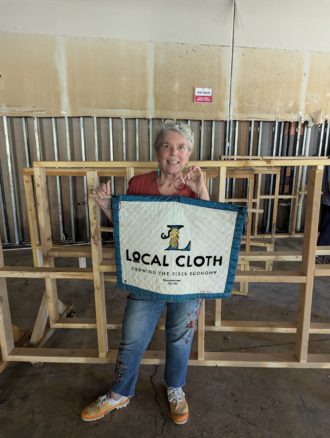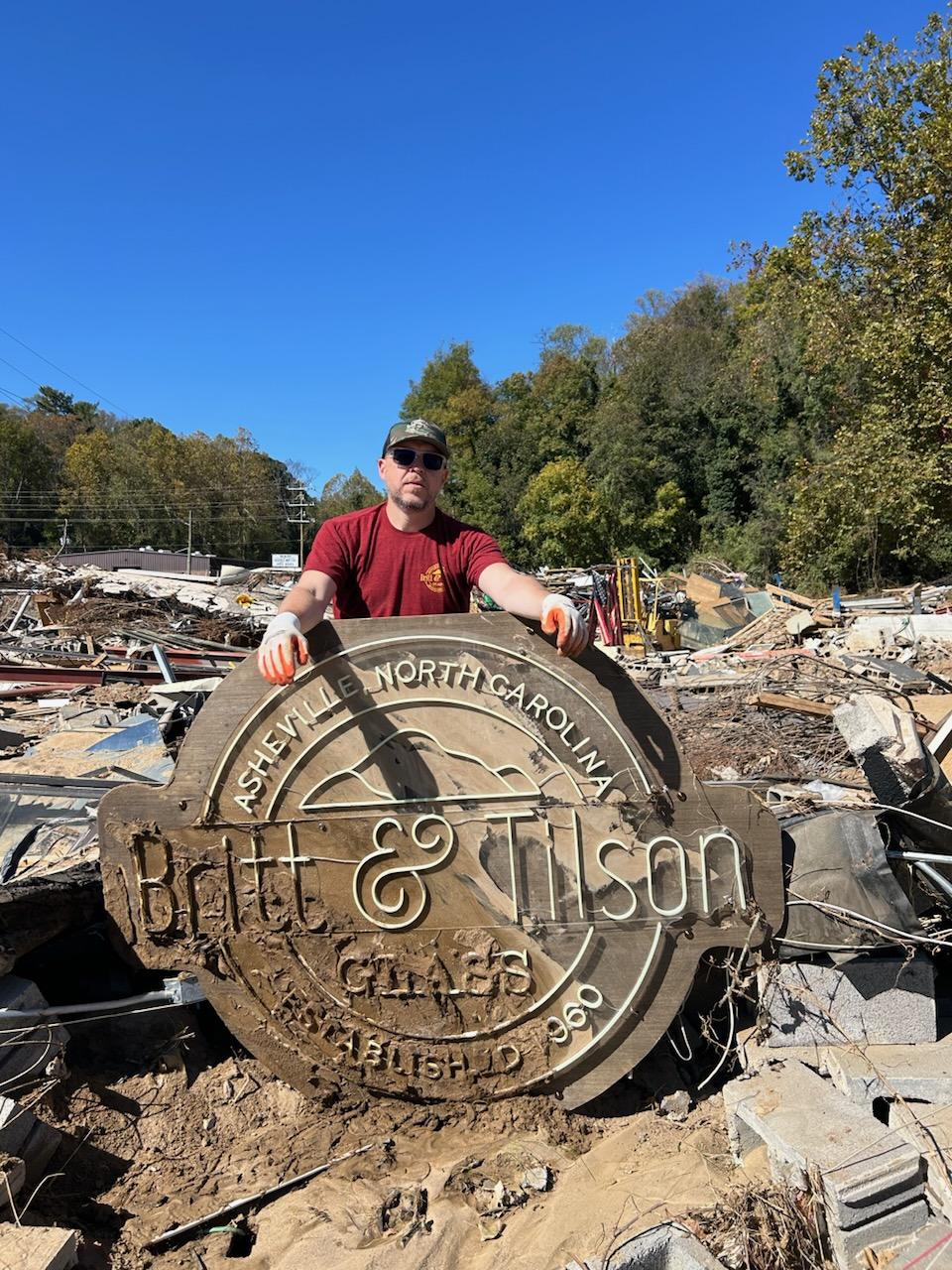Asheville business owners dealing with the aftermath of Tropical Storm Helene have a simple message for local customers: We’re still here, and we need your support.
That’s true of establishments that were able to open right after the storm, those that opened weeks later and those that suffered major storm damage and have yet to reopen. And it’s even true of businesses that lost everything and have to start over in new spaces.
“Our physical location is gone, but we want to let people know that we still exist,” says Billy Britt, owner and CEO of Britt & Tilson Glass, which had operated on Swannanoa River Road since 1960. The building that housed the glass and mirror shop was destroyed by floodwaters, but Britt is determined to keep the family business alive.
“My grandfather started our company,” he explains. “My father’s been in our company his whole life. I’ve been in our company my whole life. It’s kind of ingrained in us.”
After a brief stay in a temporary space, Britt & Tilson Glass is now operating out of a leased space at 44 Buck Shoals Road, Unit 201, in South Asheville. Starting over in a new building after more than six decades will be challenging for the company, which offers custom cuts, shower enclosures, window frames and more. But Britt says he owes it to his employees and customers to keep going.
“We’re still Asheville and Western North Carolina’s home for all your glass needs, and that’s not going to change. People just have got to give us a little grace and bear with us as we try to rebuild as best as we can.”
With the 2025 Go Local card available this week (see sidebar), here is a look at three other Asheville businesses that are in the process of picking up the pieces post-Helene.
Rebuilding in the RAD
When flooding from Helene devastated the River Arts District, Local Cloth was among the organizations that lost nearly everything. The fiber arts nonprofit operates a studio, along with artist spaces and a retail shop, at 408 Depot St.

“We had 11 feet of muddy water crashing in through the front door and knocking down the front window of our studio,” says Judi Jetson, the organization’s chair. “Everything swirled around in that muddy water, and then as it came out, it made a big jumble of everything in a pile of mud that was about 6 inches deep. All the artists’ work and all the stuff that was in the studio was destroyed.”
In all, Local Cloth suffered about $500,000 in losses, she estimates.
The good news is that the building itself, which has six retail units on its ground floor, did not suffer structural damage and is being repaired. Local Cloth is determined to reopen in the same spot because it has found the RAD to be an ideal location since moving there in 2021.
“So it’s just a question of how quickly we can get our studio rebuilt,” she says. “Optimistically, I’m saying we could probably be back in there by the first of January, and it’ll probably take us a month to get everything upfitted again. I’m hoping we can have classes during January and then have our retail shop back open in February.”
When the space reopens, Local Cloth will be counting on the support of Western North Carolina residents. All of the organization’s fiber artists work within 100 miles of Asheville.
“If you want a sweater because it’s going to be cold, think about supporting a local artist instead of buying mail order,” Jetson says. “That way you support your community and the creative community. That’s what drew us all here in the first place and keeps us here. It’s like no place else in the country, probably no place else in the world.”
Going downtown
Like so many other Asheville restaurants, Twisted Laurel’s downtown location closed for several weeks due to a lack of potable water and other issues. The eatery reopened in early November using water trucked in from its Weaverville location.
But with a lack of tourists downtown, the restaurant is facing economic uncertainty, says Vince Charbonneau, managing partner.
“It’s a little scary when you start to factor in all of our overhead, to think about what we need to make and what we are going to be able to make,” he says. “Those two things don’t quite line up. But we can’t make any money if our doors are closed.”
Charbonneau encourages locals, including those who haven’t spent much time downtown in recent years, to patronize businesses like his that ordinarily rely on a steady drumbeat of tourist traffic. Parking, usually such a headache, is not a problem right now, he points out.
“I just want people to know that we’re here, we’re fighting and we’re going to do whatever we can do to earn their business. We need all the locals to help, to spend money at those businesses. Without the help, Asheville is not going to be what we know Asheville as. We’re in for a long, hard road.”
Staying put
French Broad Chocolate Factory & Cafe on Riverside Drive took in almost 7 inches of water as a result of flooding from Helene. But Daniel Rattigan, co-creator and chief of innovation for the company, knows things could have been worse.
“We did sustain damage to the retail area of our factory,” he explains. “But fortunately, the production floor, which is elevated 36 inches above that, was entirely spared a drop.”
As a result, French Broad was able to resume factory operations on Oct. 22, less than a month after Helene tore through. The company plans to reopen the Riverside Drive retail shop before the holiday rush in December. French Broad Chocolate Lounge on Pack Square began operating on a limited basis in October.
Even with the factory operating, French Broad Chocolate is facing a big financial hit. While the company can rely on some online sales and wholesale distribution, it typically makes almost 70% of its revenue from the two Asheville retail spots.
“But we’re doing the best that we can to restore production and find ways to sell chocolate,” he says.
Rattigan says he is optimistic by nature and believes French Broad Chocolate will survive. But he also believes the effects of Helene will be long-lasting for his company and the whole region,
“I know things aren’t gonna look like they used to look,” he says. “We’re just gonna try and flow with the changes, and we’ll be here to be part of the rebuilding of Asheville. We’re not going anywhere.”




Exascerbating Asheville’s Helene impact is the foolish neglect and abuse of downtown by the council, esp Rooney and the mayor. Successful cities encourage residential growth in the core (go to downtown Greenville for a day to see what a forward looking team accomplished) which supports businesses in good times and bad. Core growth also limits sprawl and enables public transportation to be enhanced in a cost effective manner.
Examples of city action unique to downtown:
1. Close the downtown police substation
2. Impose higher taxes on the district than on any other part of the city, without a vote
3. Higher noise limits than anywhere else in the city
Of course none of our “leaders” live downtown so they aren’t directly impacted. They will be as the erosion started by Helene gains momentum. Bold Rock announced their closure today joining a host of others.